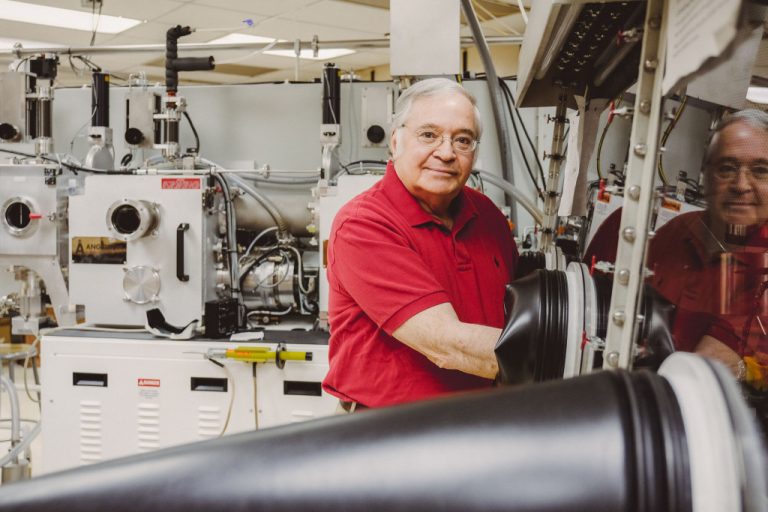
The race for small is just as important as the race was to the moon
When Neil Armstrong and Buzz Aldrin landed on the moon fifty years ago, Zeev Valentine Vardeny was a young man living in Israel. The “space race” was palpable at the time.
The “race” for ever-increasing technological innovation is profoundly felt in Israel. Putting brain power to work to maintain Israel’s safety is nothing short of a national mission.
Israel is thus home to more Nobel Prize-winning physicists than any other place in the world. If physics were baseball, it would be like the Dominican Republic.
Professor Zeev Valentine Vardeny
Professor Zeev Valentine Vardeny at the University of Utah is certainly an All-Star of physics. While most Utahns have never heard of him, Vardeny opened up an entirely new branch of physics.
Vardeny’s known to his students as “Valy.”
He has helped innovate significant advances leading to OLED (organic LEDs), organic spin-wave and technology. If these aren’t familiar then next time you look at your organic LED flat-screen TVs or put your 96 gig flash memory card in your computer, just know that Vardeny and his work are a key part of that technology.
Vardeny is the author of hundreds of physics papers. He has won international awards for his groundbreaking discoveries. But to his students, he is Valy—big-hearted, wise-cracking taskmaster who demands hard work.
Solid State Physics
His field of Solid State Physics refers to how electrons behave when traveling through materials.
Electrons flow through all of our electrical devices to provide them power. Computers transmit information and energy, but they also produce heat.
Think of your car. It can get you around, but it burns gas and produces heat through combustion. Typical electronics rely on solid-state transfer of electrons or a continuous flow of heat exchange. This requires a huge amount of additional energy that goes into cooling devices.
Using spintronic technology will help pave the way for vast changes in computer abilities that are known as quantum computers,Vardeny says, Vardeny says, “First off. In regular computers the bits of regular computers are either a one or a zero. But if you have a quantum computer the bits can have infinite possibilities. There is an infinite number of numbers between zero and one.”
Vardeny pointed out where the Department of Defense is spending a lot of money is in using quantum computers and spin waves to create an entirely new form of communication.
He said that we are currently in another very important space race, which is as important or even more important than the one with Russians fifty years ago. Are American students willing to step up to this challenge? Vardeny says his physics programs are mostly filled with Indian and Chinese students, many of which are taking their knowledge back to their respective countries. Every year the Chinese graduate as many PhDs in engineering as we currently have in the United States. Vardeny says this is concerning.
The Department of Defence and DARPA realize that if the United States doesn’t win the race to achieve quantum computing and spinwave communication, we might find ourselves losing to China. If this were to happen we could possibly lose on the largest new battleground ever seen – a cyber warfare attack where we could not compete, but become victims to an enemy whose positions attacks and moves were completely hidden.
Vardeny says this new race to miniature technology that will make it impossible for enemies to spy will define the world we inhabit in the future. If China, Russia or North Korea had this technology today, they could start a cyber war that we could not win.
But if the US government gets it first, who knows what will happen? Perhaps they could control every mainframe computer on earth. Neither scenario sounds wonderful. It will all make for a very brave, new world.
For more of Utah Stories, click HERE





